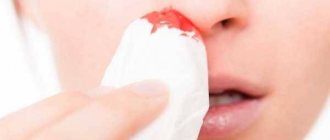Definition of disease
Allergic rhinitis (ICD code 10) is an inflammation of the nasal mucosa caused by various allergens (dust, pollen, cold air, strong odors, fungal spores). At the same time, any person experiencing this phenomenon experiences active sneezing and the release of colorless mucus from the nasal passages.
According to statistics, every third pregnant woman experiences discomfort to one degree or another when in contact with allergenic irritants.
An allergic reaction can occur only at a certain time of the year (for example, in the spring to pollen) or all year round (reaction to dust, animal dander, food products).
If a woman has experienced allergy symptoms even before bearing a child, doctors strongly recommend planning a pregnancy so that this period does not coincide with the flowering of allergenic plants.
Features of treatment
Most medications for allergic rhinitis and inflammation of the nasal mucosa cannot be used by women carrying a baby, since no one can guarantee that childbirth will not occur prematurely and that the child will not suffer.
Medication
The doctor tries not to prescribe chemicals to a pregnant woman, especially in the first trimester. But, if, in addition to sneezing and runny nose, swelling appears, which can lead to oxygen starvation of the fetus, rinsing the nose alone is not enough, you have to resort to drug therapy.
Causes
The main reason for the appearance of allergies during pregnancy is hormonal changes in the woman’s body. Against this background, a runny nose can occur even in a woman who has never encountered this problem before.
During pregnancy, due to high levels of hormones and changes in their balance in the blood, some women experience increased sensitivity to various external irritants and allergens. Upon contact with an allergen, the nasal mucosa swells and an allergic runny nose develops. Often during pregnancy, a woman may experience an allergic reaction to substances that she tolerated contact with absolutely normally before conception. In this case, after childbirth and normalization of hormonal levels, the allergy usually goes away.
The primary cause of allergic rhinitis in pregnant women is an increase in the amount of hormones in the blood. Estrogen, progesterones and growth hormones are responsible for the sensitization of the body to allergens during this period.
Most often, allergic rhinitis in pregnant women occurs due to irritants such as:
- Plant pollen, especially poplar fluff;
- Cigarette smoke;
- Bleach;
- Release of dust mites in the apartment;
- Animal fur, bird feathers;
- Components of deodorants and air fresheners;
- Insect bites (mosquitoes, wasps, bees, bedbugs, fleas, lice);
- Citrus juice;
- Helminth secretions.
Sometimes pregnant women experience an allergic reaction to low air temperatures.
In the vast majority of cases, a pregnant woman experiences sensitization to only one allergen. Thus, if allergic rhinitis occurs in response to plant pollen, then a pregnant woman will most likely not react to animal fur. In rare cases, the body becomes sensitized to several allergens.
Sometimes the consequences of other diseases of the nasal cavity, such as bacterial or viral runny nose, can contribute to the occurrence of allergies. Smoking and chronic sinusitis also contribute to increased sensitivity. Gender and fetal weight do not have any effect on the occurrence of symptoms of the disease.
How does an allergic reaction occur?
Etiology
Allergic rhinitis is caused by the body's hypersensitivity to a provoking agent (allergen). The next contact with the latter triggers a chain of specific immune reactions with the release of substances that form inflammation in the nasal mucosa. Typical provoking factors are:
- microscopic mites that live in house dust;
- wool, fluff, pet excrement;
- mold fungi, especially during the period of sporulation;
- some products;
- household chemicals, perfumes, certain medications.
It should be noted that in pregnant women the content of estrogen, β-estradiol, and growth hormone increases, which increase the reactivity of the immune system. Therefore, the intensity of attacks during gestation can increase significantly. At the same time, high concentrations of estrogen disrupt vascular motility, causing vasomotor rhinitis during pregnancy. It develops in 20-30% of women and goes away after childbirth. Only a study of plasma for the presence of class E immunoglobulins, which serve as markers of allergic reactions, can confirm or refute the allergic nature of the disease.
Symptoms
Allergic rhinitis during pregnancy is characterized by the following symptoms:
- Swelling of the nasal mucosa, nasal congestion and difficulty in nasal breathing;
- Redness of the eyes, itching in the eyes;
- Discharge of mucus or clear fluid from the nose;
- Sneezing;
- Hives and rashes on the body (in some cases).
The time when the first symptoms appear is very individual: in some women, a runny nose appears in the first weeks of pregnancy, in others - in the second or third trimester.
Signs of allergy may appear during 6 weeks of pregnancy and no more than 2 weeks after birth, or during 2 months of pregnancy and no longer occur after childbirth.
How to distinguish allergic rhinitis from other types of rhinitis?
- Allergic rhinitis, unlike sore throat or acute respiratory infections, is characterized by the absence of sore throat and cough.
- With allergic rhinitis, the temperature usually does not rise, which is typical for a cold.
- Infectious rhinitis usually goes away within a few days. Allergies can last for more than 2 weeks.
- allergic rhinitis is often accompanied by rashes on the body or face, which does not occur with other types of rhinitis.
Aqualor preparations
Aqualor products are ready-to-use solutions prepared on the basis of natural sea water. Sterility and the absence of artificial additives allow them to be used for the treatment of allergic rhinitis in pregnant women.
Isotonic solutions Aquolor Soft and Aquolor Norm help remove allergens from the nasal mucosa.
In case of severe nasal congestion and profuse runny nose, it is permissible to use Aquor Forte hypertonic solution. It will reduce swelling of the nasal mucosa by removing excess fluid from the intercellular space, thereby facilitating nasal breathing.
Possible complications
Allergic rhinitis in itself does not pose a danger to the fetus. Such a runny nose can have a negative impact on a child only in two cases:
- In very severe forms of the disease.
- In case of untimely and illiterate treatment.
Pregnant and nursing mothers should not self-medicate or not treat the disease at all for fear of harming the unborn child. It is necessary to consult a doctor and follow all his recommendations.
Symptoms of the disease in pregnant women are the same as in other patients of different ages and gender:
- colorless nasal discharge;
- itching;
- difficulty breathing;
- sneezing;
- lack of appetite;
- physical weakness.
As soon as a pregnant woman feels the listed symptoms, but body and muscle aches, fever, and chills that are usual for a respiratory viral infection are not observed, then most likely it is allergic rhinitis. A woman in a similar position should think not only about her own well-being, but also the condition of the fetus, while its health, and sometimes life, directly depends on the timely diagnosis and treatment of the patient’s ailments. Allergic rhinitis, although it manifests itself with very harmless symptoms at first glance, deserves close attention from both the patient and the doctor.
Treatment
To prescribe adequate therapy, a pregnant woman must undergo special tests to identify the causes of allergies. For this purpose, a laboratory blood test is performed for immunoglobulin E (IgE) of the patient (but in no case skin tests!).
By medication
The main task in the treatment of allergic rhinitis is to identify and eliminate the allergen. Next, the doctor determines the treatment tactics. If the problem is dust, you need to regularly clean and wash the bed; if you are allergic to food, you need to exclude them from your diet. In addition, women are recommended to adhere to a special diet, consume vitamins and microelements.
Ideally, treatment for a pregnant woman should be without the use of drugs. But in some cases they may be required. In this case, the doctor will try to prescribe only those drugs that will not affect the health of the mother and the unborn baby.
Typically, treatment for expectant mothers consists of prescribing third-generation antiallergic drugs, for example, Telfast, in the smallest dosages. Other acceptable drugs for pregnant women include Cromohexal (and all sodium cromoglycate derivatives) or products based on plant cellulose (Nazaval).
Women should be especially careful when allergic rhinitis is diagnosed in the first trimester of pregnancy. During this period, it is not recommended to use nasal corticosteroids, such as Aldecin, Rinoclenil, Fliconase, Nasonex, etc.
Also, pregnant women are not recommended to use vasoconstrictor drugs: “Sanorin”, “Dlyanos”, “Naphthyzin”, etc. These drugs can provoke a violation of the uteroplacental circulation, which will worsen the supply of oxygen to the baby’s tissue cells.
What can you use without worry?
Regular saline solution is the safest and most effective treatment for hay fever in pregnant women. You can prepare such a solution yourself (1 teaspoon of sea or table salt per 0.5 liter of boiled water) or purchase regular saline solution or the drugs Aquamaris, Salin, Marimer, Dolphin at the pharmacy. Such drugs help clear the nasal passages of mucus, dust and bacteria and thereby normalize nasal breathing .
To relieve the symptoms of allergic rhinitis in pregnant women, you can perform inhalation procedures, for example, with slightly alkaline mineral water . In this case, you first need to open the bottle so that all the gases come out of it, then dilute 2-3 tbsp. spoons of mineral water in 1 liter of boiling water. Next, cover your head with a towel and breathe in the steam for about 5-10 minutes.
Pregnant women should not undergo inhalation treatment with essential oils of calamus, mint, sage, fir, lime, etc. They can cause the symptoms of allergic rhinitis to worsen.
Treatment with folk remedies
Traditional medicine has accumulated considerable experience in dealing with the runny nose. But not all home remedies are suitable for women in an interesting situation.
Before treating rhinitis during pregnancy with “grandmother’s” recipes, you should make sure that the product used is safe.
Among the many folk recipes for treating a runny nose, the following methods have mostly been used:
- Instilling drops of onion, garlic, beet or carrot juice diluted with water or vegetable oil into the nose;
- Rinsing the nose with herbal decoctions of sage, eucalyptus leaves, black currant;
- Carrying out inhalations that have a general strengthening effect. For example, you can breathe over a pan of potatoes or add honey to water and breathe over the hot solution.
- Instillation of aloe juice into the nose, diluted with water in a ratio of 1:3.
At the pharmacy you can buy special herbal drops made from sage, mint, and thyme. Herbs rarely cause side effects, but they relieve swelling and allow the nose to breathe normally.
If you have an allergic rhinitis, it is recommended to drink more. This reduces the feeling of dryness in the nasopharynx and helps wash away germs from the mucous membrane. It is very useful to drink tea with raspberry jam.
Treatment of allergic rhinitis
At the first signs of the development of the disease, you must contact a qualified specialist. You can’t delay dealing with allergies, especially if a woman is expecting a child.
It is advisable to begin treating allergic rhinitis during pregnancy only after consulting an otolaryngologist. He will assess the patient’s condition and only then prescribe appropriate treatment.
For pregnant women, treatment of any disease is purely individual. It is important to know that, like any allergy, rhinitis goes away if the woman does not come into contact with the allergen. Therefore, first of all, it is very important to find out what the pregnant woman is allergic to. Only after this can the disease be successfully cured.
Rhinitis during pregnancy, how to treat:
- Symptoms of the disease are treated with various saline solutions. You can rinse your nose with medications such as Salin, Aquamaris or Dolphin. Thanks to such rinsing, you can free your sinuses from accumulated mucus, which will make breathing much easier. It is not advisable to use drugs such as Pinosol and Euphorbium compositum. Also, it is important not to forget that you cannot use vasoconstrictors and antibacterial drugs, especially in the first trimester.
- Third generation antihistamines are also very effective. The components that make up such drugs are not absorbed into the circulatory system, and therefore do not cause any harm to the fetus. The dosage of medications can only be determined by the attending physician. Such drugs include:
- Telfast;
- Cetirizine;
- Levocetirizine;
- Fexofenadine.
See also
Treatment of runny nose in children with folk remedies at home quickly
Read
- Cromony
Cromones are a separate group of drugs that have an anti-edematous and anti-allergic effect on the body. Unlike the group of antihistamines, their effect is not so immediate. In order for the symptoms of the disease to begin to subside, they must be taken for a sufficiently long time.
Treatment with this group of drugs can only be prescribed in the second and third trimester of pregnancy. The safest cromones include the following medications:
- Cromolyn sodium;
- Tailed;
- Ketotifen.
- Corticosteroids
Otolaryngologists do not recommend using corticosteroids, the action of which is aimed at treating the nasal mucosa, in the first trimester of pregnancy. These medications contain adrenal hormones, which have an anti-inflammatory effect on the body. The use of such sprays in therapy helps eliminate foci of the disease in the nasal cavity, and also helps accelerate the disease process.
But it is worth remembering that all corticosteroids are hormonal drugs. Their use is prohibited without a doctor's prescription. Also, improper use of medications can lead to decreased immunity.
The safest corticosteroids include:
- Nasonex;
- Metipred;
- Prednisolone.
It is worth noting that long-term use of hormonal drugs can adversely affect the health of the unborn child. They contribute to developmental delays and negatively affect the functioning of the pituitary gland.
Prevention
Pregnant women need to exclude all those foods that can be potentially dangerous and cause allergies. In addition, the expectant mother should limit going outside during the flowering period of the trees if she has had a seasonal allergy at least once in her life.
The house needs to be wet cleaned frequently to remove dust. In cold weather, pregnant women should not be near radiators or fireplaces, as they dry out the air, irritating the nose and causing sneezing.
Symptoms of allergic asthma
This article will tell you what active and passive immunity is.
Adenoids in children: symptoms and treatment //drlor.online/zabolevaniya/nosa/adenoidy/u-rebyonka-kakuyu-opasnost-oni-nesut.html
Causes of different types of rhinitis and the dangers of this condition for pregnant women
Symptoms of rhinitis during pregnancy, as a rule, appear sharply against the background of the general normal state of the body: nasal congestion, sneezing, after which the eyes begin to water, itching in the nasal cavity, swelling of the mucous membranes and transparent discharge of varying consistency appears.
But, having felt the symptoms of a runny nose, you should understand the reasons for this phenomenon, and for this it is best to consult a doctor.
It is important to correctly classify the symptom, since only in this case will the doctor be able to prescribe adequate treatment that will not harm the baby.
Rhinitis during pregnancy is usually divided into three types:
infectious; allergic; hormone.
Infectious rhinitis
The main cause of this type of rhinitis is a cold or ARVI, as well as other respiratory diseases, which occur much more often during pregnancy than in the normal state of a woman’s body.
This is due to strong changes in the functioning of the immune system, a general level of decreased protection, which is necessary to maintain pregnancy, but makes the body more vulnerable to various viruses and infections.
In case of inadequate treatment or its absence, an infectious runny nose can develop into a more serious disease, which not only requires complex therapy, but can also become a threat to the child.
Possible complications may include:
Sinusitis is inflammation of the maxillary sinuses with severe swelling of the nasal mucosa. Read more: sinusitis during pregnancy→ Frontal sinusitis, including in acute form, which is an inflammation of the frontal paranasal sinus. Sinusitis of various types , including in acute or chronic form, which is a severe inflammation of one or several sinuses of the nasal cavity. The appearance of nasal polyps , formed on the inflamed and swollen mucous membranes of the nasal cavity.
Allergic runny nose
Allergies during pregnancy are a common cause of rhinitis. In most cases, such a reaction occurs in the body when irritating substances that cause respiratory allergies enter the respiratory tract.
Such substances include animal hair and fluff, bird feathers and fluff, plant pollen, house dust, pet saliva, some types of products, perfumes, medicines, household chemicals and much more.
According to statistics, rhinitis of this type is observed in every third pregnant woman and most often in the early stages, when the female body is just getting used to the changes taking place in it.
Allergic rhinitis during the period of gestation is dangerous because allergens that enter the mother’s body and cause an inadequate reaction in it can also reach the developing fetus, as well as in the case of the mother consuming allergenic foods.
Substances entering the baby through the placenta cause a reaction in his own immune system, which does not yet have enough enzymes to neutralize harmful elements.
For this reason, the baby’s immune system begins to actively produce antibodies, remembering the foreign substance. Later, after birth, when this substance is inhaled, the child’s immune system will react by developing an allergy. Read more about allergies during pregnancy→
Hormonal rhinitis
The appearance of such a runny nose is always associated with hormonal changes and instability of its background. It appears in pregnant women, in people suffering from thyroid diseases, as well as in adolescents during puberty.
Before treating such rhinitis in pregnant women, it is important to understand that its cause is a sharp increase in the level of certain hormones.
It is the change in hormonal levels in women during pregnancy that is the most common cause of a runny nose, which is why this condition is even called “rhinitis during pregnancy.”
But you should not think that this mechanism is natural for the body, and therefore not amenable to any treatment, but goes away on its own after the baby is born.
conclusions
Thus, allergic rhinitis must be treated in pregnant women, despite its apparent harmlessness. It is best to carry out therapy under the guidance of a doctor and without the use of strong drugs. First, you should try all the safest means, because we are talking about the health of the unborn child.
A woman needs to be attentive and careful: it is better not to eat something or not to pet a cat than to later raise a sick baby. The health of the mother and the health of the baby during pregnancy are a single whole.
Also read about the treatment of allergic bronchitis and tracheitis.
Diagnostics
You can differentiate an allergic runny nose from another type of rhinitis by certain symptoms or their complete absence:
- Allergic rhinitis differs from a runny nose of respiratory origin in the absence of a sore throat and cough..
- With a runny nose of infectious origin, the temperature is often elevated, but with hay fever there is no such phenomenon.
- A runny nose caused by pathogens often goes away within 5-7 days. If this condition persists, then we can assume that the cause was hay fever.
- With allergic rhinitis, there are rashes on the skin, but with other types of runny nose this does not happen.
Allergic rhinitis quickly manifests itself when an allergen appears, and when it is eliminated, it goes away just as quickly.
An allergy to dust mite waste products is very indicative. In such a case, the pregnant woman’s nose swells only during sleep and when cleaning the home. When you are outside, nasal breathing normalizes and nasal swelling subsides. If your nose begins to run outside during the warm season, then it is highly likely that you are allergic to plant pollen. During diagnosis, the doctor finds out whether the woman suffers from allergies and whether she has a genetic predisposition to this disease. After this, the medical history is carefully studied, special attention is paid to the presence of chronic diseases. If the doctor suspects a runny nose of an allergic nature, then the pregnant woman undergoes special tests to identify sensitivity to certain allergens. A woman must be sent for a detailed blood test, culture of nasal discharge and intradermal tests. If allergic rhinitis occurs, then some of the skin tests will definitely give a positive result.
During skin testing, microdoses of allergens are injected under the skin on the back or arm using a miniature needle or using a special device . After administration, the patient is observed for several minutes and the results are assessed. If swelling and irritation appear at the site of allergen injection, the test is considered positive.
Most often, during pregnancy, women react to a certain group of irritating substances. In almost 90% of cases, allergens can be determined by skin testing.
Skin tests to determine allergens are allowed during pregnancy. In this case, a minimal amount of allergens is injected under the skin, which does not pose a danger to both the expectant mother and the child. But in exceptional cases, the body may react to the introduction of allergens in an unpredictable way, and then there is a threat to the fetus and the woman. Responsibility for any complications during skin testing lies with the doctor. If it is possible to make a diagnosis without this procedure, then it is better to avoid it for the entire duration of pregnancy.
When making a diagnosis, a pregnant woman may be offered to undergo a radioallergosorbent test. But it is worth considering that this diagnostic method is less accurate, but more expensive, in relation to skin tests.
How dangerous is this disease?
Rhinitis in pregnant women is theoretically dangerous because with it the pregnant woman’s body often finds itself in hypoxic conditions. If a woman is not trained and her lungs are not voluminous enough, even minor physical exertion with a stuffy nose will lead to shortness of breath and dizziness. Of course, a lack of oxygen can affect the development of the fetus, and the harder it is for a woman to breathe, the more pronounced this effect.
However, in a normal healthy woman, rhinitis during pregnancy does not affect the health of the fetus. This disease poses a real danger to women suffering from bronchial asthma - in their case, breathing problems can lead to disturbances in the development of the fetus, and in rare situations - to the threat of miscarriage.
Rhinitis in pregnant women also contributes to the development of arterial hypertension, insomnia, and chronic fatigue, but only if pregnant women have other factors predisposing to the development of these diseases.
Breathing problems often lead to the fact that a pregnant woman cannot sleep normally
Rhinitis in early pregnancy is almost completely safe. In the later stages, it is considered a big nuisance to place a pregnant woman in the infectious diseases department of a maternity hospital, when doctors regard rhinitis itself as a viral disease. To prevent this from happening, you should obtain in advance from your attending physician a certificate confirming the diagnosis of the disease and the absence of infection in the pregnant woman.
Symptoms of rhinitis in pregnant women
In its symptoms, rhinitis in pregnant women is similar to some forms of typical chronic rhinitis. Its most characteristic feature is nasal congestion, usually with rhinorrhea (an abundance of snot), with the woman’s general general health being normal. In case of illness, nasal breathing is simply impaired:
There is a feeling of excess mucus in the nose; In some cases, a large amount of snot actually appears, sometimes, on the contrary, there is too little of it, not enough to fully moisturize the mucous membrane; The nasal passages may dry out (especially with active nose blowing), crusts and cracks appear in them, and pain in the nose appears; It becomes difficult for a pregnant woman to breathe; her nose gets especially stuffy during sleep due to the horizontal position of the body and the rush of blood to the head.
Normally, with rhinitis in pregnant women, the head may hurt only after physical exertion.
Due to impaired nasal breathing, a pregnant woman may develop shortness of breath, and sometimes she may experience headache attacks, but they usually go away after rest and being in the fresh air.
Review
“Whoever had rhinitis during pregnancy, tell me which doctor to go to with it - an ENT specialist, a gynecologist, an infectious disease specialist? The symptoms do not seem to be very severe - the nose is stuffy, there is snot, but there is no runny nose, I feel fine as long as I am lying down and not out of breath. Is it even worth going to the doctor in this case, or will it go away on its own?”
Alla, from correspondence on the forum
Rhinitis in pregnant women almost never spreads to the pharynx or sinuses. For this reason, sinusitis, eustacheitis or nasopharyngitis (posterior rhinitis) in pregnant women are almost always the consequences of viral or bacterial infections, but not hormonal rhinitis of pregnant women.










